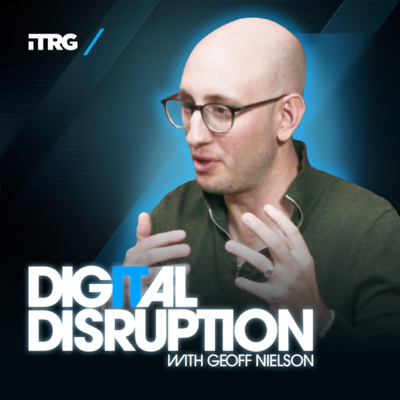
Digital Disruption with Geoff Nielson
By Info-Tech Research Group
Digital Disruption is where industry leaders and experts share insights on leveraging technology to build the organizations of the future.
As intelligent technologies reshape our lives and our livelihoods, we speak with the thinkers, the doers and innovators who will help us predict and harness this disruption. Join us as we explore how to adapt to and harness digital transformation.
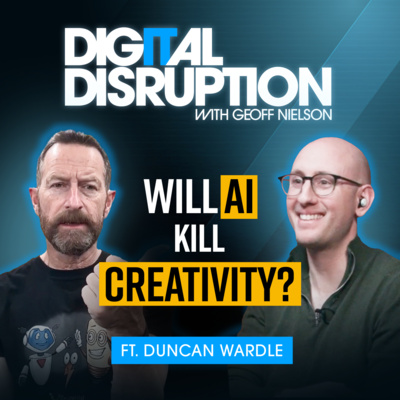
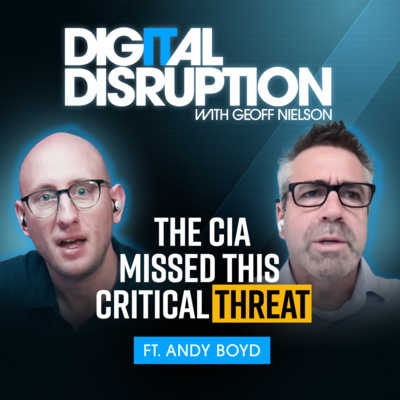
Ex-CIA Cyber Chief: Here's What Keeps Me Up at Night
In a world of rising cyber threats, what keeps the CIA’s former head of cybersecurity up at night?
Today on Digital Disruption, we’re joined by Andy Boyd, former Head of the CIA’s Center for Cyber Intelligence.
Andy was a Senior Intelligence Service officer in the Central Intelligence Agency’s Directorate of Operations (DO). His most recent assignment was Director of the CIA’s Center for Cyber Intelligence (CCI) which is responsible for intelligence collection, analysis, and operations focused on foreign cyber threats to US interests. Andy has experience leading worldwide intelligence operations and has in-depth knowledge of geopolitics, cyber operations, security practices, and risk mitigation.
Andy sits down with Geoff to discuss the future of cybersecurity in a rapidly evolving digital world. With decades of experience in cyber intelligence, Andy explains how global threats are evolving, from traditional espionage to AI-driven cyberattacks and disinformation. He dives into how intelligence agencies like the CIA assess and respond to state-sponsored cyber threats from China and Russia, and why the private sector is now a primary target. Andy breaks down how emerging technologies like generative AI are changing both offensive and defensive cyber strategies, and what this means for governments, businesses, and people. Andy also shares how one of the world’s leading professional services firms is navigating this new landscape, using culture, data, and innovation to stay ahead of cyber risks.
In this episode:
00:00 Intro
02:45 What the CIA's Cyber Intelligence Center actually does
05:30 Leading transformation across a global enterprise
07:20 Evolution of cyber threats from nation-states
08:15 Building trust and transparency with business stakeholders
11:10 The critical role of data in decision-making
13:00 How the CIA detects and responds to cyber attacks
17:05 Creating a culture of innovation and adaptability
17:45 The private sector as a frontline target
20:40 How Aon is approaching talent and upskilling
23:10 Offensive cyber operations: how far should the U.S. go?
27:30 Key leadership lessons and advice for future CIOs
29:50 China's cyber capabilities vs. Russia's tactics
35:25 The role of intelligence in election security
40:50 Why disinformation is more dangerous than hacking
45:30 How AI is transforming cyber espionage
50:10 What keeps Andy Boyd up at night
54:40 The importance of public awareness and resilience
Connect with Andy:
LinkedIn: https://www.linkedin.com/in/andrew-g-boyd-12194673/
Visit our website: https://www.infotech.com/
Follow us on YouTube: https://www.youtube.com/@InfoTechRG
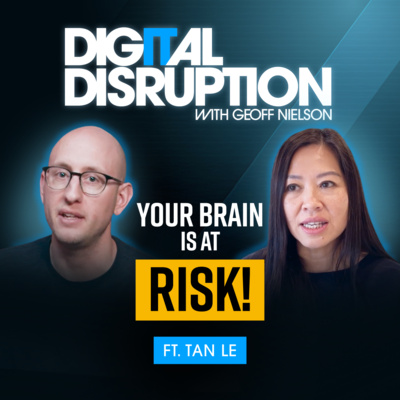
Unlocking the Brain: Tan Le on Neurotech, AI & Human Potential
What if you could control technology using only your thoughts?
Today on Digital Disruption, we’re joined by an expert in the space of Brain-Computer Interfaces (BCIs), Tan Le.
Tan is the founder and CEO of EMOTIV, a Silicon Valley-based company pioneering EEG-based BCI technology. Her work centers on non-invasive “brainwear” that enables direct interaction between the human brain and computers. Tan is an advocate for democratizing neurotechnology to empower individuals, researchers, and organizations to drive innovation. In February 2020, she published her first book, The NeuroGeneration: The New Era of Brain Enhancement Revolutionizing the Way We Think, Work and Heal.
Tan sits down with Geoff to talk about how her company is making it possible to connect your brain directly to digital systems, no hype, just science. From decoding mental commands to enhancing human cognition, they dive into the ethical challenges of reading brain data, what it really means to give technology access to your mind, and why non-invasive headsets are reshaping human-computer interaction.
In this episode:
00:00 Intro
03:00 Tan Le’s background
06:00 What is Brain-Computer Interface (BCI)?
09:00 The current state of BCI in 2025
12:00 Non-invasive vs. implantable tech
15:00 How BCIs read brain signals
18:00 Real-world applications: Healthcare and beyond
21:00 Consumer use cases and accessibility
24:00 The role of AI in brain signal interpretation
27:00 Ethics of brain data and consent
30:00 Mental wellness and performance insights
33:00 Government and regulatory perspectives
36:00 EMOTIV’s vision and tech stack
39:00 Human enhancement and neuroplasticity
42:00 Risks and misconceptions around BCI
45:00 Collaborations and research partnerships
48:00 Global adoption trends
51:00 Tan Le’s advice to future innovators
54:00 Predictions for the next 10 years
Connect with Tan:
Website: https://www.emotiv.com/
LinkedIn: https://www.linkedin.com/in/tanle/
X: https://x.com/TanTTLe
Visit our website: https://www.infotech.com/
Follow us on YouTube: https://www.youtube.com/@InfoTechRG
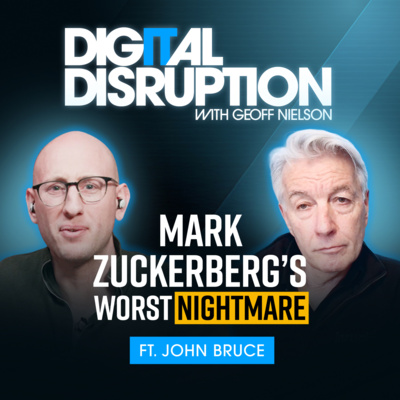
Taking Back Your Data: Why the Next Web MUST Protect Digital Freedom
What if your data worked for you and not the platforms controlling it?
Today on Digital Disruption, we’re joined by John Bruce, CEO and Co-Founder of Inrupt.
With a background as both a founder and an executive at global tech firms, John Bruce is uniquely qualified to help engineer the next phase of the web alongside his co-founder Sir Tim Berners-Lee. He brings to bear decades of successful business leadership and experience creating new markets around innovative software. Prior to partnering with Tim, he was the co-founder and CEO of Resilient, now an IBM company, that developed a new approach to cybersecurity. Through Resilient and four other successful startups, John has experienced first-hand the strategic challenges that the current structure of the web causes for users, developers, and organizations around the world.
John Bruce sits down with Geoff Nielson to talk about a future where individuals and not platforms own their data. John shares how AI, consent-driven data sharing, and a decentralized digital wallet called, Charlie could fundamentally reshape how we interact with technology, institutions, and each other. He explains why we must reclaim personal data from tech giants and what “agentic wallets” are and how they work.
In this video:
0:00 Intro
1:25 Rebuilding the Web
3:30 From Tim Berners-Lee to today
5:10 Data ownership vs. data surveillance
7:00 Moving from platforms to people
9:15 What Is an Agentic AI wallet?
11:00 Why consent must be baked into AI and data flows
13:45 Use cases in healthcare, government & enterprise
16:10 “Decentralized” doesn’t mean disorganized
18:30 What leaders get wrong about data control
20:45 Enterprise integration
23:00 The ROI of giving users control of their own data
25:30 Why this moment feels like the early days of the web
27:00 What’s next for Inrupt, Solid, and the Internet itself
29:00 How We rebuild digital trust
31:00 Inrupt's vision beyond 2030
34:00 Partnering with institutions to scale Solid
37:00 Global digital identity and governance challenges
40:00 Building public trust in data ecosystems
43:00 A non-linear view of it all
Connect with John:
Website: https://www.inrupt.com/about
LinkedIn: https://www.linkedin.com/in/johnwbruce/
Visit our website: https://www.infotech.com/
Follow us on YouTube: https://www.youtube.com/@InfoTechRG
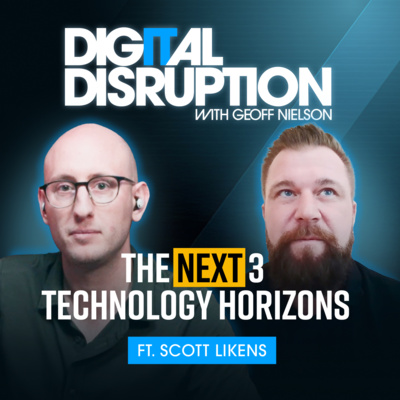
Synthetic Humans & Quantum AI: The Future of Humanity
Is your business ready for a world where AI agents act, adapt, and make decisions for you?
Today on Digital Disruption, we’re joined by Global Chief AI Engineer at PwC, Scott Likens.
Scott Likens serves as the Chief AI Engineer at PwC, overseeing both the Global and U.S. teams. He leads the AI Engineering and Emerging Technology R&D groups, driving the firm’s strategy across AI, blockchain, VR, quantum computing, and other disruptive technologies. With over 30 years of experience in emerging tech, Scott has helped clients across industries transform their customer experience, digital strategy, and operations. He began his career in software engineering during the early days of the internet, working with major multinationals to apply a localized lens to global digital and innovation trends. Scott’s diverse technical background spans advanced analytics, digital architecture, AI engineering, and innovation. During his time at PwC, he has lived and worked in both China and the U.S., serving as a global technology leader and advisor to key clients. He is a regular speaker at international conferences on emerging technologies, including AI and generative AI, blockchain and crypto, IoT, quantum computing, and advanced robotics.
Scott Likens sits down with Geoff Nielson for a look into what’s actually happening across the front lines of AI and innovation. Scott shares insights from the edge of tech, from AI agents and embodied intelligence to quantum computing and synthetic identities. He explains why most enterprise AI efforts fail to scale, how to think in innovation “horizons,” and what separates real value from hype. He touches on many topics including, how holographic AI and digital twins are already reshaping communication and the skills, and structures shaping the IT organization of the future.
In this video:
0:00 Intro
1:55 GenAI hype vs. real Value in the enterprise
4:20 Embodied AI and the rise of holographic humans
6:00 Multilingual synthetic avatars
7:30 Deepfakes, trust & the role of blockchain in authentication
9:00 Responsible AI
12:15 Innovation is moving faster than trust
14:00 Speed or scale?
16:00 Defining true innovation vs. incremental tech
18:00 A Framework for emerging tech
20:30 From quantum to satellites: What’s next
23:00 Digital Twins, IoT, and Bipedal Robotics
25:30 AI at the edge
28:45 AI agents in action
30:20 Legacy system modernization without rewriting code
34:00 Enterprise use cases
36:30 What business leaders get wrong about tech
39:00 Moving from pilot projects to organization-wide impact
42:30 Balancing speed, risk & innovation in enterprise ai
44:00 How PwC enables innovation without losing control
47:00 Why “waiting” is not an ai strategy
48:15 The most important investment is your workforce
50:00 Upskilling, hiring, and culture shift at scale
52:00 Quantum, cryptography & the real threat timeline
54:30 What’s next for leaders and innovators
Connect with Scott:
LinkedIn: https://www.linkedin.com/in/scottlikens/
X: https://x.com/ScottLikens
Visit our website: https://www.infotech.com/
Follow us on YouTube: https://www.youtube.com/@InfoTechRG
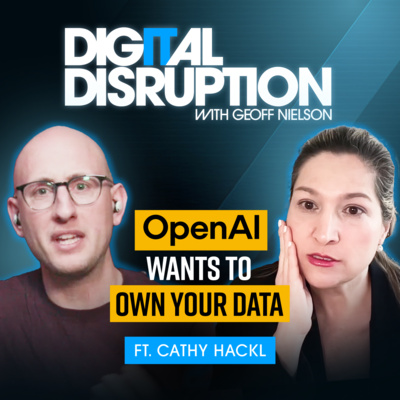
How Spatial Tech Will Change Your Reality Forever
Is the Metaverse dead? Why is #OpenAI building jewelry? What happens when AI becomes more emotionally present than people?
Today on Digital Disruption, we’re joined by CEO of Future Dynamics and author, Cathy Hackl.
Cathy is a globally recognized tech and gaming executive, futurist, and keynote speaker specializing in spatial computing, AI, virtual worlds, and gaming platform strategy. She is the co-CEO of Future Dynamics, a spatial computing and AI solutions firm, and a top LinkedIn tech voice. Known as the “Godmother of the Metaverse,” she created the Tech Intimacy Scale and is currently researching the intersection of AI, love, and relationships. Cathy has held leadership roles at Amazon Web Services, Magic Leap, and HTC VIVE, and has guided major brands like Nike, Walmart, Ralph Lauren, Louis Vuitton, and Clinique through their emerging tech and gaming strategies. She has spoken at events hosted by Harvard Business School, MIT, CES, SXSW, and the World Economic Forum. Named one of Ad Age’s Leading Women of 2023 and featured on Forbes Latam’s cover for its 100 Most Powerful Women issue, Hackl is also listed among Vogue Business's 100 Innovators. She hosts Adweek’s TechMagic podcast and contributes to Vogue Singapore. In 2022, she made history as the first human to ring the NASDAQ opening bell both physically and in avatar form on live TV.
Cathy Hackl sits down with Geoff Nielson for an honest conversation about where technology is headed and what’s really happening with spatial computing, AI hardware, and the future of human connection. Cathy unpacks the evolution of the metaverse and why she believes we’re moving toward something bigger: the spatial web. She shares her first-hand experience with Google Beam, a revolutionary 3D communication technology that doesn’t require a headset. This episode dives into OpenAI’s push into hardware, why it’s a data play, and what that means for your privacy. Emotional technologies like Apple Vision Pro and what they mean for memory, grief, and connection, and the future of dating and relationships in a world filled with AI agents and romantic chatbots.
In this episode:
0:00 Intro
1:00 Is the Metaverse dead or just renamed?
3:00 Google Beam: 3D communication without a headset
5:00 The Apple moment: reaching for a virtual object
7:00 Dating, job interviews & presence in 3D
9:00 Will this replace video calls?
11:00 Apple vision pro
13:00 Memory preservation & future family photos
15:00 OpenAI’s hardware push
17:00 AI Agents and who controls your data
20:00 From ChatGPT to therapy bots
22:00 Emotional manipulation, mental health & ai advice
24:00 Who owns the virtual air around you?
27:00 Virtual real estate, annotations & air rights
30:00 The battle for our senses
35:00 Tech that arrived too early
37:00 Why dating in 2D doesn’t work in a 3D world
39:00 Spatial computing in creative industries
41:00 Where tech meets intimacy, memory & legacy
44:00 The real use case: Human connection
47:00 The future of emotional presence and what’s at stake
49:00 Getting It Right Matters
Connect with Cathy:
LinkedIn: https://www.linkedin.com/in/cathyhackl/
Instagram: https://www.instagram.com/cathyhackl/
Facebook: https://www.facebook.com/HacklCathy
Visit our website: https://www.infotech.com/
Follow us on YouTube: https://www.youtube.com/@InfoTechRG
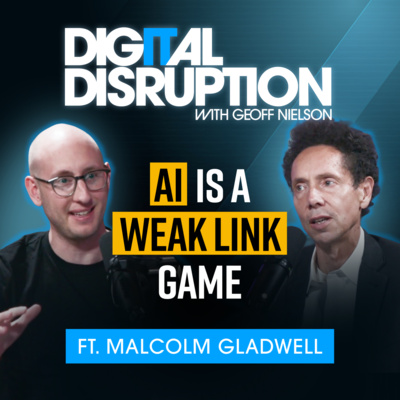
Malcolm Gladwell on Tesla, RFK, and Why AI Could Save Us
Can generative AI help us close the gap between expertise and access?
This week on a special episode of Digital Disruption, we're joined by New York Times best-selling author Malcolm Gladwell, recorded live in Las Vegas at Info-Tech Research Group's LIVE tech conference.
Malcolm Gladwell is the author of eight New York Times bestsellers, including his latest, Revenge of the Tipping Point. Named one of TIME’s 100 Most Influential People and one of Foreign Policy’s Top Global Thinkers, he is renowned for his unique perspective on the forces shaping human behavior and society. An extraordinary speaker, Gladwell combines eloquence, warmth, and humor to both entertain and challenge audiences. Through masterful storytelling, he unpacks complex and often misunderstood ideas, from decision-making in Blink and the roots of success in Outliers, to our underestimation of adversity in David and Goliath, and the missteps we make when interacting with strangers in Talking to Strangers.
Malcolm Gladwell sits with Geoff Nielson for an engaging conversation on the future of AI, the power of storytelling, and the evolving forces that shape society. From AI’s role in closing the expertise gap to how unexpected narratives drive lasting cultural change, Gladwell offers his signature perspective: thoughtful, contrarian, and always surprising. He talks about why the most transformative uses of AI may be the simplest, how generative tools can elevate human capability, and why culture never changes in ways we expect. Malcolm provides insight into how the media, brands and politics are changing and what that could mean for leadership, while touching on the surprising truth about misinformation, expertise, and AI as a corrective tool.
In this episode:
0:00 Intro
0:24 AI's biggest promise? Strengthening weak links
1:33 AI in developing vs developed countries
2:12 Should AI replace or empower teachers?
3:13 Closing the expertise gap with AI
4:18 AI as a safe place to learn without embarrassment
5:08 The human side of AI
5:32 AI in surprising places
6:15 Malcolm’s personal use of AI
7:57 Where Malcolm finds ideas and why AI can’t replicate them
9:52 Why creativity can’t be automated
12:42 Will AI ever replace storytellers and thinkers?
14:24 Paul Simon’s genius explained
17:27 What makes a great story? Tesla example
22:26 Are people the new brand? Apple vs Chevy
25:13 The power of "overstories" in shaping behavior
26:57 We live in multiple narratives at once
29:26 Can organizational culture be changed?
30:37 How cultural narratives evolve
31:37 Politics, power, and social media’s new role
35:07 We’re still figuring out what tech is for
38:10 Why AI disruption might not be as bad as we fear
39:34 Is Malcolm an optimist or just realistic?
41:22 Can AI restore trust in expertise?
43:43 The power of narrative over facts
44:15 Poking the bear
Connect with Malcolm:
Website: https://www.gladwellbooks.com/
X: https://x.com/Gladwell
Instagram: https://www.instagram.com/malcolmgladwell/
Visit our website: https://www.infotech.com/
Follow us on YouTube: https://www.youtube.com/@InfoTechRG
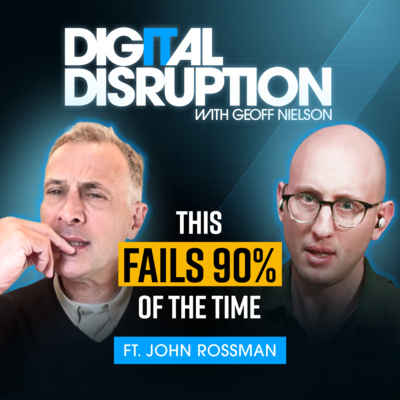
Forces That Will Radically Transform Society in the Next Decade
Can your organization survive its own hesitation to take bold bets?
Today on Digital Disruption, we’re joined by former Amazon exec and bestselling author, John Rossman.
John is an author, business advisor, and keynote speaker. He was an early Amazon executive who played a key role in launching the Amazon marketplace business in 2002. He has served as the senior technology advisor at the Gates Foundation and senior innovation advisor at T-Mobile. His books include “The Amazon Way” and “Think Like Amazon.” His new book, Big Bet Leadership: Your Transformation Playbook for Winning in the Hyper-Digital Era, is an actionable guide for leaders who want to succeed in complex transformations.
John sits down with Geoff to unpack why most change initiatives fall short, and what leaders can do to shift the odds in their favor. Looking back on his experience launching Amazon Marketplace and advising top organizations, he shares strategies for scaling effectively, leading through change, and building resilience in today’s digital environment. John explains why traditional transformation efforts often fail, the issues leaders come across, and how to adopt a system of risk-smart decision-making and drive meaningful change. Get ready to challenge assumptions, cut through the hype, and transform the way you lead.
In this episode:
00:00 Intro
01:07 Solving hard problems with an integrated mindset
03:07 Why most companies struggle with change
04:21 The 3 megatrends disrupting business
06:32 Why Back-office productivity must change
07:22 Why Past winners are at risk of losing
09:36 Why big bets often fail
13:30 The three habits of big bet leaders
16:42 Why innovation labs often fail
21:39 Why leaders must design decision points intentionally
25:03 The power of a clear “Big Bet Vector”
31:27 What extreme accountability really means
36:08 Should we abandon silos?
40:25 Advice for how CIOs can unlock progress despite technical debt
46:08 How CIOs can win
51:55 Why Change can’t just be an operator’s job
53:01 The Big Bet Playbook explained
56:27 Active skepticism
Website: https://johnrossman.com/
LinkedIn: https://www.linkedin.com/in/john-rossman/
X: https://x.com/johnerossman
Connect with John:
Visit our website: https://www.infotech.com/Follow us on YouTube: https://www.youtube.com/@InfoTechRG
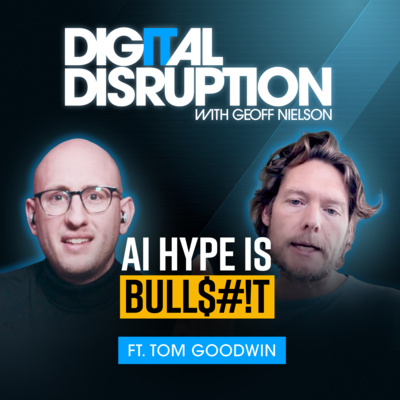
The Big Lie Behind AI Hype: Tom Goodwin on the Future of Business
What if the biggest threat to progress isn’t technology?
Today on Digital Disruption, we’re joined by Tom Goodwin, Co-Founder of All We Have Is Now.
Tom Goodwin is a four-time LinkedIn “#1 Voice in Marketing.” He is also the Co-Founder of, All We Have Is Now, a digital transformation consultancy helping businesses harness emerging technologies. A sought-after speaker, writer, and advisor, Tom also hosts The Edge, a tech-focused TV series, and My Wildest Prediction, a podcast with Euronews. In 2021 Tom published the second edition of his book “Digital Darwinism” with Kogan Page, in 2023 Tom launched a comprehensive online Digital Transformation course, and has now spoken in over 100 cities in 50 countries around the world.
Tom sits down with Geoff to share his perspective on the evolving digital landscape and how to cut through the noise especially around AI, digital transformation, and innovation — to focus on what truly matters for organizations today. He argues that in a time of rapid technological change, the smartest move may be to slow down, ignore the hype, and prioritize people, processes, and a long-term strategic vision. Tom urges leaders to think critically, stay grounded in fundamentals, and embrace thoughtful, human-centered progress over flashy solutions.
In this video:
00:00 Intro
01:11 Why tech hype needs a reality check
02:06 What actually matters in 2025
03:04 Business first, not tech first
04:11 Why not every company needs to chase every trend
05:16 The problem with constant agility
07:13 Why disruption isn’t always real
10:18 Are we avoiding hard truths about our business models?
12:12 Who wins: legacy companies or startups?
15:28 Will AI-native companies dominate?
17:09 Why real change still takes time
19:07 Hype vs. reality in AI adoption
22:47 Technology adoption is slower than you think
24:02 Advice to leaders on using AI strategically
26:44 Why short-term thinking is overrated
29:05 Planning for what really matters
31:00 A better approach to technology prioritization
33:18 Why digital transformation usually fails
34:49 The Heathrow metaphor: patchwork vs. reinvention
39:06 The promise of AI for real reinvention
42:20 Are IT leaders being left behind?
44:00 Why the CTO must be more strategic
47:03 What it takes to lead digital transformation
48:22 Why we need more ambitious use of existing tech
50:01 Tom’s book: Digital Darwinism
51:40 What happens when AI becomes invisible tech
53:13 We need clearer conversations around AI
Connect with Tom:
Website: https://www.tomgoodwin.co/
LinkedIn: https://www.linkedin.com/in/tomfgoodwin/
X: https://x.com/tomfgoodwin
Visit our website: https://www.infotech.com/
Follow us on YouTube: https://www.youtube.com/@InfoTechRG
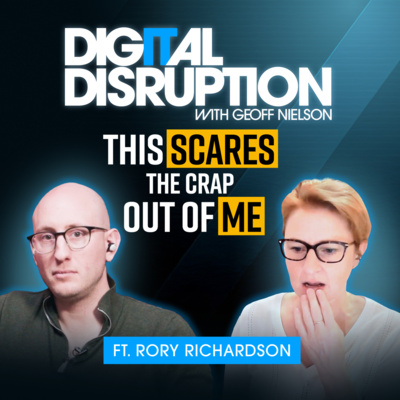
What Amazon’s AI Leader Thinks About the Future of Your Job
Is AI coming for your job, or just the parts that you hate doing?
Today on Digital Disruption, we’re joined by Rory Richardson, Director of Go-To-Market for Generative AI at Amazon Web Services (AWS).
With over a decade of experience at AWS, she has been instrumental in launching and scaling breakthrough technologies, including non-relational databases and serverless computing. Rory has played a pivotal role in shaping the future of cloud development through her strategic leadership in go-to-market initiatives, empowering developers to expand the boundaries of what’s possible in the cloud. Driven by a passion for innovation, her current focus is on harnessing the potential of generative AI to transform developer tools, enabling more efficient, creative, and human-centered development processes.
Rory sits down with Geoff to explain how generative AI can supercharge the developer experience, helping teams write better code, faster, and with fewer headaches. She shares her perspective that AI isn’t about replacing people, but about helping us do less of what we dislike, and why embracing AI now is one of the smartest moves leaders can make.
Rory shares real-world examples from AWS, insights from developer culture, and a human-centered view on the rapidly changing AI landscape.
In this episode:
00:00 Intro
01:04 Recap of Info-Tech LIVE 2024 in Las Vegas
01:35 What’s new in AI & developer tools
02:53 The rise of AI-powered command line tools
03:32 Why Amazon is paying people to play
06:44 “Vibe Coding”
08:10 Differential equations & development tools
12:00 Risks of rapid AI adoption
13:32 What does coding look like in 2028?
16:20 Creativity, context-switching & grit
18:07 How play drives innovation
19:34 Teaching AI in schools
23:10 Is age the biggest barrier to AI adoption?
28:20 What should junior Devs expect?
30:38 Better AI boundaries
35:01 Will AI replace Developers?
37:25 Accelerating innovation, not replacing humans
42:24 Why AI works best on repetitive tasks
44:11 Let AI do the dishes, not the art
46:04 From Paris, Texas to Amazon Web Services
48:19 Everything is learnable
49:09 The grit factor
Connect with Rory:
LinkedIn: https://www.linkedin.com/in/roryr/
Visit our website: https://www.infotech.com/Follow us on YouTube: https://www.youtube.com/@InfoTechRG
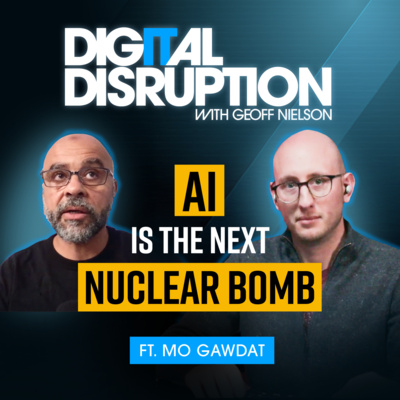
Ex-Google Officer on AI, Capitalism, and the Future of Humanity
Is the real threat of AI the technology or the humans behind it?
Today on Digital Disruption, we’re joined by Mo Gawdat, former Chief Business Officer of Google X.
Mo is the host of the popular podcast Slo Mo: A Podcast with Mo Gawdat, and the author of several international bestsellers, including Solve for Happy, Scary Smart, That Little Voice in Your Head, and Unstressable. He is also the founder of One Billion Happy and currently serves as Chief AI Officer at Flight Story. With a 30-year career in tech, Mo has since shifted his focus to the pursuit of happiness and human well-being. He has extensively researched the science of happiness and engaged in conversations with some of the world’s leading thinkers. More recently, his work has centered on the urgent ethical and societal challenges posed by rapid advancements in artificial intelligence.
Mo sits down with Geoff for an unfiltered conversation on the future of humanity in the age of artificial intelligence. Mo explains that we’re living in the early stages of a technology-fueled dystopia, one that is driven not by AI itself, but by humans who shape it by greed, power, and unchecked capitalism. But he also shares a vision for a future of unprecedented abundance, one where AI could solve global challenges, from climate change to poverty, but only if we as humans embrace ethical design and mutual cooperation.
In this episode:
00:00 Intro
01:20 AI, geopolitics, and capitalism
03:05 Is the problem human nature or systems?
06:22 The coming age of abundant intelligence
08:13 AI’s dark side
13:15 Fear-driven ai development
17:10 Handing power to ai
19:14 Why superintelligent ai could save us
21:12 Can we avoid an ai Hiroshima moment?
25:30 Mutual prosperity or destruction
29:11 The age of machine supremacy
31:00 How to influence AI for good
33:12 AI reflects humanity
36:06 What AI is learning from us right now
40:06 Who thrives in the AI era
44:04 The rise of mind manipulation
47:02 How to stay critical in a world of deepfakes
49:12 Use AI to expand your thinking, not replace it
51:21 The leadership skills of the future
54:42 Collaborating with AI as team members
57:20 Will AI want to connect with us?
01:01:06 Could AI become conscious?
01:04:48 AI emotions and the next evolution of intelligence
01:06:32 The role of humans
Connect with Mo:
Website: https://www.mogawdat.com/
LinkedIn: https://www.linkedin.com/in/mogawdat/
YouTube: https://www.youtube.com/c/mogawdatofficial
Instagram: https://www.instagram.com/mo_gawdat/
Tik Tok: https://www.tiktok.com/@mogawdat
Visit our website: https://www.infotech.com/Follow us on YouTube: https://www.youtube.com/@InfoTechRG

Disney Chief: How AI Will Change Creativity Forever
Creativity is the key to staying competitive, so why do so many organizations struggle to innovate?
Today on Digital Disruption, we’re joined by Duncan Wardle, former Head of Innovation and Creativity at Disney.
Duncan and his team helped Imagineering, Lucasfilm, Marvel, Pixar, and Disney Parks to innovate, creating magical new storylines and experiences. Now a global keynote speaker and innovation advisor, he shares his unique Design Thinking approach to help organizations spark creativity, unlock fresh thinking, and embed innovation into their culture. A TED speaker and contributor to Fast Company, Forbes, and Harvard Business Review, Duncan also teaches innovation Master Classes at Yale, Harvard, and the University of Edinburgh.
Duncan sits down with Geoff to explore how businesses can break down the barriers to innovation by tapping into their most powerful resource: human imagination. Duncan gives a look into the magic of Disney’s approach to creativity and explains how companies can design cultures that foster curiosity, risk-taking, and collaboration. From solving complex problems with simple questions to creating space for disruptive thinking, Duncan shares practical, transformative advice for leaders ready to think boldly and challenge the current workplace roles.
In this episode:
0:00 Intro
2:00 Time at Disney
5:40 Creativity is now the most in-demand skill
8:15 Barriers to innovation
11:30 Tools for creative thinking
14:45 Reframing problems as innovation
18:10 The power of naïve experts
21:00 Innovation at Disney
25:50 Tips for embedding in any organization
29:00 How leaders can foster innovation
32:00 Tools to think differently
33:21 Overhyped tools
34:01 What’s different about Gen Z
36:03 Duncan’s mission to unlock creativity
39:03 Changing culture
Connect with Duncan:
Website: https://duncanwardle.com/
Twitter: https://x.com/duncanjwardle
Instagram: https://www.instagram.com/duncanjwardle
LinkedIn: https://www.linkedin.com/in/duncanwardle/
Visit our website: https://www.infotech.com/
Follow us on YouTube: https://www.youtube.com/@InfoTechRG
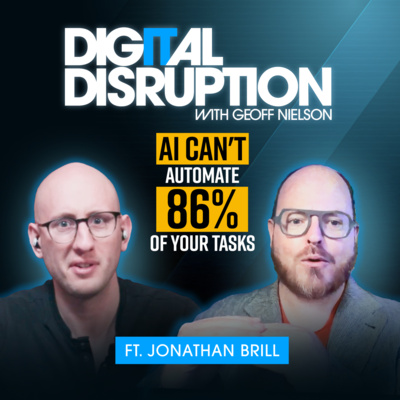
What AI Can Never Understand: Futurist Jonathan Brill Explains
With all the AI hype, is there still a place for humans in organizations?
Today on Digital Disruption, we’re joined by Jonathan Brill, the world’s top-ranked futurist by Forbes, advisor to Amazon, HP, Samsung, and an author.
Jonathan helps executives and audiences spot, prioritize, and act on the forces shaping the next five years — from AI to geopolitical disruption. As the former Global Futurist at HP and a board member of one of the world’s largest private intelligence agencies, he brings unique insights from decades of work in innovation, strategy, and emerging tech. His invention firms have developed over 325 products, generating more than $27 billion in revenue for clients like HP, Samsung, and Verizon. Jonathan is the author of Rogue Waves, praised by The Economist and Adam Grant, offering a practical framework for thriving through disruption. He shares his insights globally on stages like TED, at institutions like Harvard and CERN, and with media outlets including ABC, CNBC, and HBR.
Jonathan sits down with Geoff Nielson to explore what leaders need to do to survive and thrive through the next decade of accelerating technological disruption. They discuss why the traditional organizational model introduced in the railroad era is no longer equipped to handle the complexity of AI-powered transformation. Jonathan speaks on the concept of the "octopus organization," where intelligence, decision-making, and adaptability are distributed rather than centralized. He breaks down AI’s biggest shift not just in task automation, but in decision-making and organizational design and emphasizes the importance of psychological safety in successful AI adoption.
In this episode
0:00 Intro
1:14 Enterprise AI
2:47 Code and complexity
6:07 From Railroad Model to Octopus Organization
9:35 AI isn’t just automating work
12:03 Why CIOs must lead cultural change
18:28 Human intuition is still important
20:16 Four leadership traits for the AI era
25:32 Executional vs. strategic thinking in IT
29:39 The real value of coding in the future
35:16 AI’s superpowers
38:57 Human vs. machine
41:21 Specialists vs. generalists in an AI world
47:02 Optimism despite disruption
49:48 Governments will shape the pace of change
53:04 What’s the hype and what’s real?
58:19 Tech adoption is inevitable
Connect with Jonathan:
Website: https://www.jonathanbrill.com/
LinkedIn: https://www.linkedin.com/in/jonathanbrill1/
YouTube: https://www.youtube.com/@brill_jonathan
Visit our website: https://www.infotech.com/Follow us on YouTube: https://www.youtube.com/@InfoTechRG
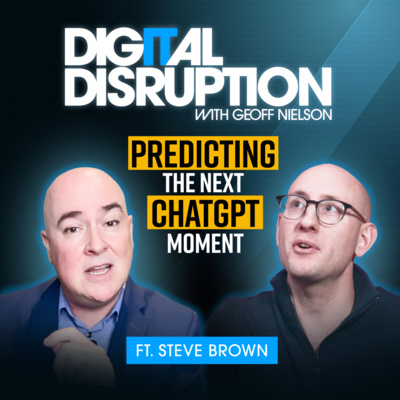
The 6 Technologies That Will Define the Future with AI Futurist Steve Brown
If you're not ready for the speed of change — you're already behind.
Today on Digital Disruption, we’re joined by Steve Brown, a leading voice in the field of artificial intelligence and a former executive at Google DeepMind and Intel.
Steve has delivered hundreds of engaging keynotes and AI innovation workshops across five continents. With over 25 years of experience in AI and emerging technologies, Steve helps organizations build winning strategies that drive innovation, boost productivity, and fuel growth. He has advised leading brands including Nike, JP Morgan, Samsung, Comcast, Audi, Bank of America, PepsiCo, and Disney. Steve is the co-founder of The Provenance Chain Network, a BCG Luminary, and an advisor to multiple AI startups. He has been featured on CNN, BBC, Bloomberg, Forbes, and The Wall Street Journal. His book, The Innovation Ultimatum, explores how six strategic technologies will reshape every business in the 2020s. He holds bachelor's and master's degrees in Micro-Electronic Systems Engineering from Manchester University and lives in Portland, Oregon.
Steve sits down with Geoff Nielson to explore how AI, robotics, and automation are reshaping business, education, and the future of work. Steve reflects on the six emerging technologies he forecasted in The Innovation Ultimatum, where he got it right, and what surprised him — from the power of process orchestration and the quiet rise of blockchain, to the next potential “ChatGPT moment.” Steve also shares a preview of his upcoming book, The AI Ultimatum, and what business leaders need to know now to stay relevant and human in an AI-powered economy.
In this episode:
0:00 Intro
0:42 Revisiting 2019's predictions
2:04 The Rise of process orchestration
3:11 Process orchestration
5:12 AI and sales enablement
6:33 Blockchain’s future
11:14 The mixed reality opportunity
13:49 What’s the next “ChatGPT moment”?
15:12 Robotics, Quantum & what's next
18:40 The real AI transformation opportunity
20:10 Top 3 areas where AI is impacting businesses
21:37 AI-enabled employee experiences
22:54 From lockdown to enablement
24:36 Getting started with AI transformation
28:01 Unexpected use cases
31:29 The education disruption is coming
36:20 Learn to get the most out of AI
37:48 How to become robot-proof
40:39 What gives life meaning
43:20 Creativity in the age of AI
45:42 The rise of one-person enterprise
49:19 Do we need AGI
50:50 Hype vs. reality
52:10 The AI Ultimatum
53:36 Speed of change
Connect with Steve:
Website: https://www.stevebrown.ai/about
LinkedIn: https://www.linkedin.com/in/futuresteve/
Visit our website: https://www.infotech.com/Follow us on YouTube: https://www.youtube.com/@InfoTechRG
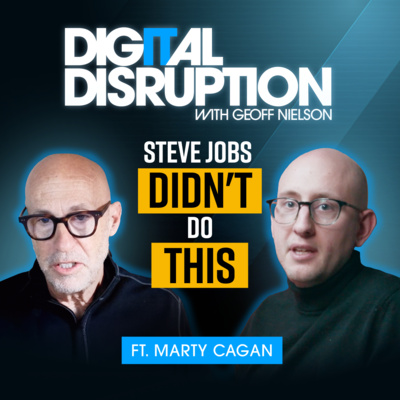
Marty Cagan Explains How to Design a Product Like Steve Jobs
What does it really take to build a product-driven organization in the age of AI, and are organizations ready for what's coming next?
Today on Digital Disruption, we’re joined by Marty Cagan, product thought leader and founder of the Silicon Valley Product Group.
Before founding the Silicon Valley Product Group (SVPG) to focus on helping others build successful products through writing, speaking, advising, and coaching, Marty Cagan served as a product executive at some of the world’s most successful technology companies, including HP Labs, Netscape Communications, and eBay. Through his work with SVPG, Marty is a sought-after speaker at major conferences and leading companies around the world. He is also the author of three influential books: Inspired: How to Create Tech Products Customers Love, Empowered: Ordinary People, Extraordinary Products, and Transformed: Moving to the Product Operating Model.
Marty sits down with Geoff Nielson to discuss how generative AI is reshaping product management and why organizations need to rethink how they build and lead product teams. He outlines three key models of product management and explains how AI is disrupting each one differently. This conversation dives deep into modern product thinking, as Marty highlights what sets companies like Amazon, Apple, Tesla, and Netflix apart — emphasizing the importance of visionary leadership and product-centric thinking. Marty also gives a look into his latest book Transformed, which explains how even the most traditional organizations can adopt modern product practices.
In this episode:
00:00 Intro
00:30 How generative ai is shifting product roles
01:20 The 3 models of product management explained
03:00 Why product owner roles are most at risk
05:00 Upskilling in the world of AI
06:25 What execution roles must to learn
07:30 The Feature Team Model and its vulnerabilities
09:00 Top product companies getting it right
10:40 What great product leadership looks like
13:00 Bill Campbell’s coaching culture
15:10 Empowered engineers
17:00 The Steve Jobs myth
20:00 Product discovery at Apple explained
21:30 Executive resistance
23:00 Real-world case studies
25:35 The importance of pilot teams
29:00 From surviving to thriving with gen ai
30:30 The 3 Meta questions
33:00 Why transformation takes time
36:00 How to use pilot teams
39:00 The anti-patterns
42:30 Why coaching works better than consulting
45:00 Emerging tech
47:00 Crypto vs. Gen AI
48:00 Enterprise products work
51:00 Can the product model work in government?
Connect with Marty:
LinkedIn: https://www.linkedin.com/in/cagan/
Website: SVPG: Learn the Product Operating Model : Silicon Valley Product Group
Visit our website: https://www.infotech.com/
Follow us on YouTube: https://www.youtube.com/@InfoTechRG
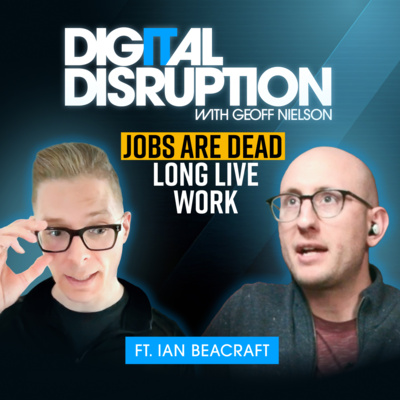
AI Is Rewriting the Rules of Work: Futurist Ian Beacraft Explains Why Jobs are Dead
Today on Digital Disruption, we’re joined by Ian Beacraft, Chief Futurist and Founder of Signal and Cipher.
He is one of the leading voices in AI and the future of work. As Chief Futurist and Founder of Signal and Cipher, Ian helps organizations become AI-ready through strategic workforce transformation, training, and innovation. Ian has advised top global brands including Samsung, Google, Microsoft, and Nike. A former agency executive, he now pioneers immersive presentations that bring AI and extended reality to life. Ian is also the co-owner of a production studio designing virtual worlds and the first person ever to host a news segment as a synthetic human, streaming to over 100 million devices around the world. A classically trained musician and passionate educator, he champions the responsible, creative use of emerging technologies—and remains an optimist about the future of humanity in a tech-driven world.
Ian sits down with Geoff Nielson to unpack the real impact of artificial intelligence on the workplace. They discuss why outdated leadership mindsets are more harmful than AI itself, how organizations must evolve beyond rigid roles and job descriptions, and why the future of work is less about replacing people and more about reshaping how we define value, productivity, and collaboration. Ian explains that it’s not about eliminating jobs, but about eliminating the artificial boundaries that confine people to specific roles within an organization.
In this episode:
0:00 Intro
0:45 The real threat is not AI, but outdated leadership
2:15 The era of unending exponential growth
4:30 AI is changing the definition of work
8:15 Where leaders should begin with AI
12:35 Using AI tools to align leadership team
15:30 What AI really needs to succeed
17:00 The loss of job descriptions
19:02 The shift in career thinking
21:50 Who’s at more risk – junior roles or long-time workers?
25:30 The future of work in practice
31:00 Digital Twins in the workplace
36:00 Build AI ready teams
41:00 Rethinking education
46:01 What role does Signal and Cipher play to help accelerate traditional enterprises
52:35 What’s next
58:00 Tracking innovation and adaptability
1:04:00 Building a future-ready organization
Connect with Ian:
LinkedIn: https://www.linkedin.com/in/ianbeacraft/
X: https://x.com/Ianbcraft
Website: https://signalandcipher.com/
Visit our website: https://www.infotech.com/Follow us on YouTube: https://www.youtube.com/@InfoTechRG
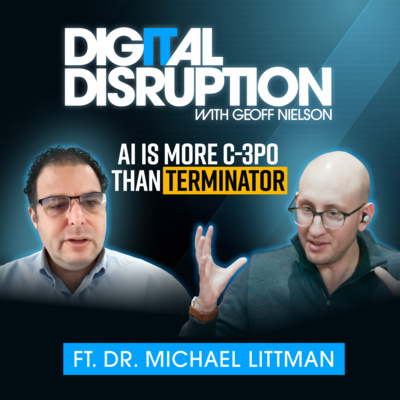
AI Expert Dr. Michael Littman: This is Why Everything You Know About AI is Wrong
What if everything you thought you knew about AI was wrong?
Today on Digital Disruption, we’re joined by Dr. Michael Littman, Division Director for Information and Intelligent Systems at the National Science Foundation.
The Information and Intelligent Systems division is home to the programs and program officers that support researchers in artificial intelligence, human-centered computing, data management, and assistive technologies, as well as those exploring the impact of intelligent information systems on society. He is also University Professor of Computer Science at Brown University, where he studies machine learning and decision-making under uncertainty. He has earned multiple university-level awards for teaching and his research has been recognized with three best-paper awards and three influential paper awards. Littman is a Fellow of the Association for the Advancement of Artificial Intelligence and the Association for Computing Machinery. Summer of 2025, he will become Brown University's inaugural Associate Provost for Artificial Intelligence.
Dr. Michael Littman sits down with Geoff Nielson to explore the misconceptions about AI, its real-world applications, and what the future holds. Dr. Littman challenges common fears about AI replacing humans, emphasizing the importance of human-AI collaboration rather than competition. He talks about ethical considerations, the evolution of AI decision-making, and the balance between automation and human oversight. They unpack what is next in the world of artificial intelligence and why understanding the technology's limitations is just as important as embracing its potential.
In this episode:
0:00 Intro
0:50 How AI technology has evolved
3:24 Is the public ready for AI
6:30 Sci-fi view of AI
7:46 The underlying fear
12:40 Society is adaptive
16:00 This current round of AI gives us new tools
20:15 New era of computer science
23:16 AI is creating new roles
27:25 The different kinds of education
32:40 Dissemination mechanism
34:36 How AI works as an organization
36:45 Importance of AI education
38:28 How the National Science Foundation supports AI research
43:23 What about AGI
48:27 Future predictions
52:34 The goal is to help organizations make the best use of this moment
54:00 AI in the 80s to now
Connect with Dr. Michael Littman:
Website: https://www.littmania.com/
LinkedIn: https://www.linkedin.com/in/michael-littman-b26351/
X: https://x.com/mlittmancs
Visit our website: https://www.infotech.com/
Follow us on YouTube: https://www.youtube.com/@InfoTechRG
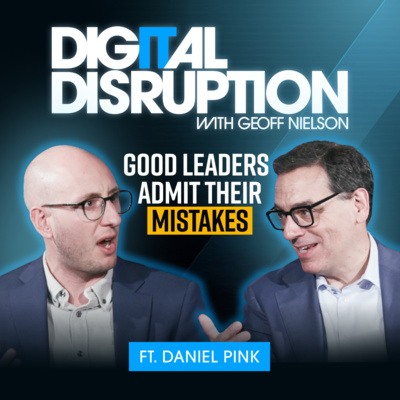
Dan Pink: What Society Gets Wrong About Work
The future of work is changing, and organizations will need to rethink what an “office” truly means.
Today on Digital Disruption, we’re joined by Daniel Pink, New York Times best-selling author and workplace expert.
Daniel Pink is the author of five New York Times bestsellers, including his latest, The Power of Regret: How Looking Backward Moves Us Forward. His other books include the New York Times bestsellers When and A Whole New Mind — as well as the #1 New York Times bestsellers Drive and To Sell is Human. Dan’s books have won multiple awards, have been translated into 46 languages, and have sold millions of copies around the world.
Daniel sat down with Geoff at Info-Tech LIVE 2024 in Las Vegas for an insightful conversation about the future of work — what’s next, what to expect, and where it’s all headed. Daniel shares his perspectives on the evolving world of work and the challenges leaders face in navigating uncertainty. He talks about the importance of experimenting with new approaches and discovering meaningful work. Dan challenges the notion that anyone has all the answers about the future of work and instead encourages leaders to try, learn, and adapt.
Interested in attending Info-Tech LIVE this year? We’re back in Vegas this June 10 - 12, and tickets are still available! Check the link to learn more. https://www.infotech.com/events/las-vegas-live-june-10-12-2025
In this episode:
0:00 Intro
0:25 Info-Tech LIVE 2025
1:51 Time of uncertainty
2:20: Fundamental questions about work and the ‘office’
5:32: The importance of making progress
5:52: Uncomfortable behaviors as leaders
7:45 Burnout
10:50 Entering a world of permanent hybrid
14:41: The power of regret
17:20 What is the new normal?
21:53 How are technological advancements shaping society
24:40 Things will get better
Connect with Daniel:
LinkedIn: https://www.linkedin.com/in/danielpink/
Website: https://www.danpink.com/
Visit our website: https://www.infotech.com/
Follow us on YouTube: https://www.youtube.com/@InfoTechRG
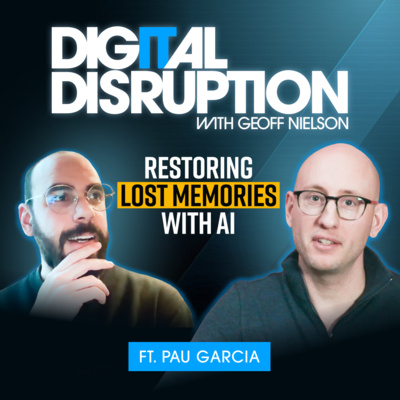
Tech Start-Up Founder Is Treating Alzheimer’s with AI
Will AI be able to reconstruct lost memories?
Today on Digital Disruption, we’re joined by Pau Aleikum Garcia, media designer and founder of Domestic Data Streamers.
Pau is a media designer and the founder of Domestic Data Streamers, a Barcelona-based studio that has been creating immersive “info-experiences” and generative AI projects since 2013. His work spans over 45 countries, collaborating with institutions like the United Nations, Barcelona City Hall, and Citizen Lab. Pau is the chair of the Master in Data in Design program at ELISAVA University and is a guest lecturer at institutions including the School of Visual Arts (NY), the Hong Kong Design Institute, the Royal College of Art (London), and the Barcelona School of Economics. In 2021, he founded HeyHuman!, an artist residency program that merges music, journalism, and data to drive artistic research and social justice.
Pau sits down with Geoff to talk about how his organization is unlocking some of the most human experiences through synthetic memories. This initiative uses generative AI to recreate lost visual memories, particularly for refugees, migrants, and those affected by war or displacement.
They explain how AI is not just shaping the future but also helping to reclaim the past, as well as the conversation that led to the creation of this technology. They also discuss ethical considerations of working with vulnerable communities. The project is also being explored in dementia care, where AI-generated memories are being tested as a tool for reminiscence therapy.
In this episode:
0:00 Intro
0:52 What are synthetic memories?
2:18 The making of Domestic Data Steamers
3:39 Why images and physical spaces matter for cultural identity
5:00 Dystopian, futuristic idea
8:33 Working with migrant communities
9:47 Where this technology is being deployed
12:11 Low-cost and accessible technology
13:50 The importance of emotional connections
15:08 The images are artificially generated representations of memory vectors
17:30 Working with memories
21:40 Commercial interest
22:43 AI is never neutral
23:55 Skeptic reader
30:09 Understanding the data
34:14 The cost of corruption
36:37 How to stay informed
40:41 The future of AI is bright
44:20 Domestic Data Streamers and the many projects
48:30 Accomplishments and the future
Connect with Pau:
LinkedIn: https://www.linkedin.com/in/pauerrr/
Twitter: https://x.com/pau_aleikum
Website: https://www.domesticstreamers.com/
Visit our website: https://www.infotech.com/Follow us on YouTube: https://www.youtube.com/@InfoTechRG
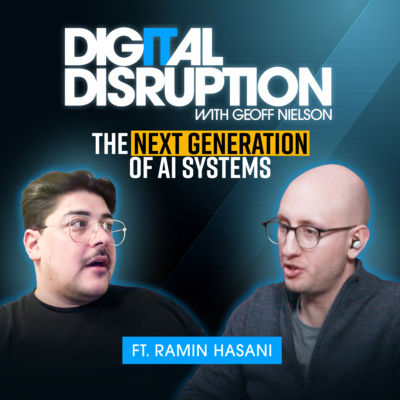
CEO of Liquid AI Ramin Hasani Says a Worm is Changing the Future of AI
A new era of intelligent technology is here.
Today on Digital Disruption, we’re joined by Ramin Hasani, co-founder and CEO of Liquid AI and a machine learning Scientist.
Ramin Hasani is the co-founder and CEO of Liquid AI and a machine learning scientist at MIT’s Computer Science and Artificial Intelligence Lab (CSAIL). Previously, he was a Principal AI & ML Scientist at Vanguard and a Research Affiliate at MIT. His work focuses on robust deep learning and decision-making in complex dynamical systems. He earned his Ph.D. in Computer Science from Vienna University of Technology, with his research on Liquid Neural Networks receiving global recognition with numerous nominations and awards such as TÜV Austria Dissertation Award nomination in 2020, and HPC Innovation Excellence Award in 2022. Ramin is also a frequent TEDx speaker.
Ramin sits down with Geoff to share his new and unique approach to AI, inspired by biological and physical systems that could redefine how businesses use machine learning.
Ramin shares insights from biology, specifically the neural structures of simple organisms that have led to the development of Liquid Neural Networks (LNNs). Unlike traditional neural networks, LNNs use differential equations to model dynamic decision-making processes, making them more adaptable for real-world applications. They discuss the advantages of these approaches and the scaling of these models. They also talk about the future of AI and how it may not just be about bigger models but smarter, biologically inspired intelligence capable of transforming how we interact with technology today and into the future.
In this episode:
0:00 Intro
0:38 The story of Liquid AI technology
6:13 Transparent worm vs. traditional neural networks
14:15 Liquid AI’s mission to build powerful AI systems
18:12 Liquid AI will help you to develop the best kind ofmodels
20:03 Compelling use cases
22:12 Agentic behavior
26:30 The most surprising use cases
29:35 This is a better learning system
32:01 Efficiency of liquid foundation models as opposed toGPT
35:33 Is this tech ready for the market?
38:30 The ‘white box’ philosophy and how it works with this model
43:07 Where do you see this technology in 3 to 5 years?
44:40 Trusted and understandable technology
46:00 The new platform for AI that replaces it all
48:40 Is there a quantum play here?
51:05 Passion turned to reality
54:20 Cracked the equation
55:40 The future of intelligence
Connect with Ramin:
Website: https://www.raminhasani.com/
LinkedIn: https://www.linkedin.com/in/raminhasani/
Visit our website: Information Technology Research & IT Advisory Company | Info-Tech Research Group
Follow us on YouTube: Info-Tech Research Group - YouTube
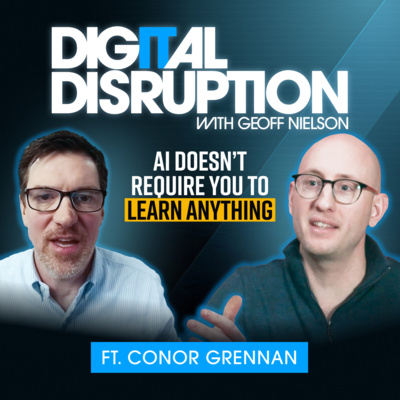
Chief AI Architect at NYU Conor Grennan: How to Adopt AI Without Causing Chaos
Is adopting AI more about behavior than technology?
Today on Digital Disruption, we’re joined by Conor Grennan, Chief AI Architect at NYU Stern School of Business and a best-selling author.
At NYU Stern School of Business, Conor builds generative AI fluency across the institution. He is also CEO and Founder of AI Mindset, an AI consulting company that trains professionals, leaders and organizations on a new and effective framework for generative AI. Conor has worked with teams across industry, including OpenAI, McKinsey, NASA, Google, Amazon, and many more.
Conor sits down with Geoff to share his unconventional takes on successful change management in AI adoption. They discuss why integrating AI isn’t just about implementing new tools, it’s about changing behaviors, training senior leadership, adapting talent strategies, and redefining productivity.
He explains that AI adoption rates are low because AI itself doesn’t teach new skills but rather requires a change in behavior. Simply instructing employees to use AI isn’t enough; organizations need to recognize and address the psychological resistance to change.
In this episode:
0:00 Intro
0:21 The importance of AI adoption and change management
0:38 AI is not like normal technology
1:55 AI doesn’t require you to learn anything
3:05 Use cases don’t really work
5:22 Organizational use of AI for managers and leaders
7:12 Train senior leaders first
9:33 Do we need to separate the AI from the person?
10:03 Laws and limitations
12:33 Helping organizations understand AI
14:44 Who is going to win
17:49 Use AI as a tool to attract the best talent
19:42 The framework and how it works
23:40 The story of AI use cases
26:18 Is everyone struggling to adopt AI?
28:42 Are we playing catchup with technology forever?
30:55 How to drive AI adoption and understanding
34:33 The age of AI agents
37:13 The potential and possibilities
40:11 Two types of bubbles
43:58 The autonomous enterprise
47:03 Prompt engineering
Connect with Conor:
Website: https://www.ai-mindset.ai/
Instagram: https://www.instagram.com/conorgrennan_official/
X: https://x.com/conorgrennan
LinkedIn: https://www.linkedin.com/in/conorgrennan/
YouTube: https://www.youtube.com/@UCS9HfvYleu3t8MDqsZr8lLA
Tik Tok: https://www.tiktok.com/@conorgrennan_official
Follow us on YouTube: https://www.youtube.com/@InfoTechRG
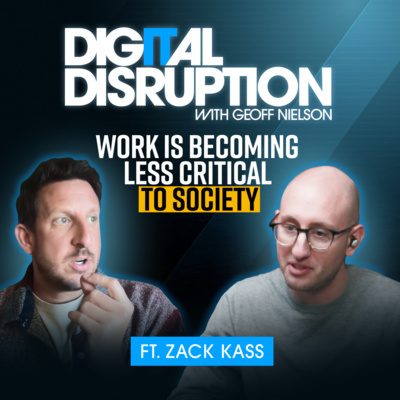
Former OpenAI Lead Zack Kass: How AI Will Change Society Forever
Are we on the verge of the most profound industrial revolution in human history?
Today on Digital Disruption, we’re joined by Zack Kass, an AI futurist and former Head of Go-To-Market at OpenAI. As a leading expert in applied AI, he harnesses its capabilities to develop business strategies and applications that enhance human potential.
Zack has been at the forefront of AI and played a key role in early efforts at commercializing AI and large language models, channeling OpenAI’s innovative research into tangible business solutions. Today, Zack is dedicated to guiding businesses, nonprofits, and governments through the fast-changing AI landscape. His expertise has been highlighted in leading publications, including Fortune, Newsweek, Entrepreneur, and Business Insider.
Zack sits down with Geoff Nielson to give the inside scoop on the future of AI and the broader impact of digital disruption. They discuss the future of work, how organizations need to respond to survive, and the human skills that will become increasingly valued. Zack describes this transformation as the next Renaissance.
In this episode:
0:00 Intro
0:44 The next Renaissance
1:47 First major expansion of human potential
2:58 The way we understand the universe is changing
4:31 Supercharging the experts
6:12 We will see the biggest changes in the next 50 to 100 years
7:42 Human social structure is potentially disruptive
10:03: Conflict
12:04 Facing the new normal
14:12: Future conflict between people and the state
15:15 The future of work is changing
23:06 Who are the new competitors?
25:35 AI on your device
27:18 Where the economy is going
28:56 The rise of passion projects
29:30 Disruption in the workforce
32:33 The Fortune 1000 heading towards dramatic change
35:36 T big negative space of AI
37:09 What AI is going to solve for and what it will not
40:30 Creating a humanistic place
44:11 Telling the story matters
48:46 The challenge
51:11 Technological hegemony and corporate greed
52:06 Building the future
Connect with Zack:
Website: https://zackkass.com/
LinkedIn: https://www.linkedin.com/in/zackkass
YouTube: https://www.youtube.com/@ZackKassAI
Follow us on YouTube: https://www.youtube.com/@InfoTechRG
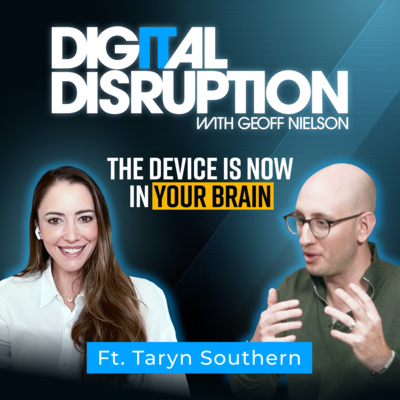
Taryn Southern: How AI Is Unlocking Human Creativity
Which emerging technologies are most likely to collide – and what does this mean for the future?
Today on Digital Disruption, we are joined by Creative Technologist Taryn Southern, a pioneering storyteller known for her work at the intersection of emerging technology, creativity, and human potential.
Taryn’s journey with AI began in 2017 with a groundbreaking creative experiment—to compose an entire music album using artificial intelligence. The result, I AM AI, became one of the first AI-assisted pop albums and reached the Top 100 on the U.S. Radio Charts in 2018.
Taryn sits down with Geoff Nielson to reveal the overlooked, hair-raising technologies shaping our future—and why she’s optimistic about AI as a force for good.
What we talk about:
0:00 Intro
1:48 Hair-raising moments
3:08 Predictions
4:43 AI taking over creative tasks
9:09 Is using an AI tool more challenging than just doing it yourself?
11:35 Any one person can be a merchant
13:50 These organizations need to be on their toes
15:08 What role do major tech companies play
17:24 The algorithms
19:00 Trusting the tech companies
19:48 Where is this going
24:28 Impact on individual and collective well-being
26:06 What is the state of Neurotechnology
30:54 Brain computer interface and mass adoption
32:00 The scope of creativity is unlimited with BCI
33:32 Hair-raising moments
35:13 Will we lose a lot of human connection with AI?
36: 44 Your perfect reality
38:35 A better path to success
39:36 AI therapists?
Connect with Taryn:
Website: https://tarynsouthern.com/Instagram:
https://www.instagram.com/tarynsouthern/
X: https://x.com/TarynSouthern
Facebook: https://www.facebook.com/tarynsouthern
YouTube: https://www.youtube.com/@TarynSouthern
Follow us on YouTube: https://youtu.be/oKIgSAFcAkI